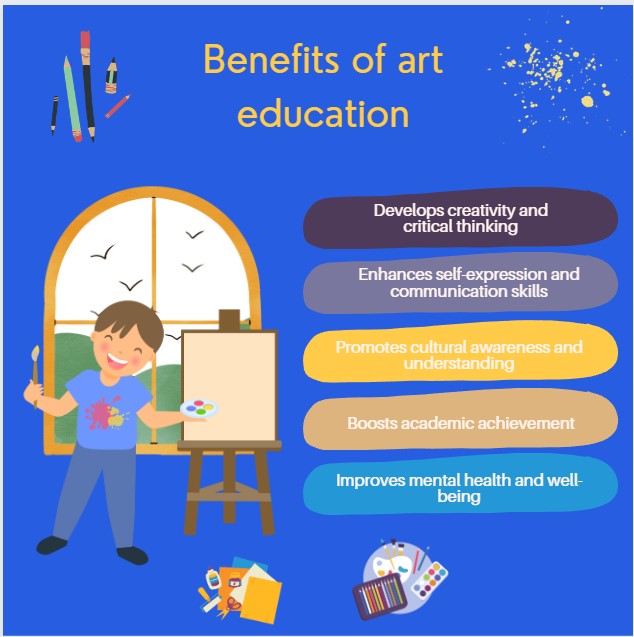Unveiling the Profound Benefits of Arts Education
In a world increasingly shaped by technological advancements and scientific discoveries, the significance of arts education may sometimes be overlooked. However, the arts play a vital role in fostering creativity, critical thinking, cultural understanding, and emotional intelligence. This article explores the multifaceted benefits of arts education, highlighting its impact on cognitive development, academic achievement, personal growth, and societal enrichment.
Cultivating Creativity and Innovation
At its core, arts education nurtures creativity—an essential skill in problem-solving, innovation, and adaptation to change. Through visual arts, music, dance, theater, and literature, students explore different forms of expression, experiment with ideas, and learn to think outside the box. Creative thinking encourages individuals to approach challenges from multiple perspectives and devise original solutions, preparing them for future careers in fields such as design, technology, and entrepreneurship.
Enhancing Cognitive Development
Engaging in the arts stimulates various cognitive functions, including:
-
Critical Thinking: Analyzing artworks, interpreting themes, and evaluating techniques develop analytical skills and enhance cognitive flexibility.
-
Memory and Attention: Learning scripts, musical compositions, or choreographies improves memory retention and concentration.
-
Spatial Reasoning: Visual arts and architecture cultivate spatial awareness and geometric reasoning abilities.
Academic Achievement and Skills Acquisition
Research indicates that students involved in arts education often exhibit higher academic performance and develop transferable skills essential for success across disciplines:
-
Literacy and Language Skills: Reading, writing, and interpreting literature, poetry, and scripts strengthen language proficiency and comprehension.
-
Mathematical Proficiency: Music theory and rhythm enhance mathematical skills through patterns, sequences, and proportions.
-
Collaboration and Communication: Participating in group performances, artistic collaborations, and critiques fosters teamwork, communication skills, and empathy.
Fostering Emotional Intelligence and Well-being
The arts provide a platform for self-expression, emotional exploration, and empathy-building:
-
Self-Expression: Creating art allows individuals to communicate feelings, thoughts, and experiences in non-verbal ways, promoting self-awareness and emotional resilience.
-
Empathy and Perspective-Taking: Engaging with diverse artistic narratives and cultural expressions cultivates empathy and understanding of different perspectives.
-
Stress Reduction: Music, visual arts, and dance offer therapeutic benefits, reducing stress, anxiety, and promoting relaxation.
Promoting Cultural Understanding and Diversity
Arts education celebrates cultural heritage, traditions, and global perspectives, fostering appreciation for diversity and inclusivity:
-
Cultural Awareness: Studying diverse artistic traditions, historical contexts, and global influences broadens cultural literacy and promotes respect for cultural diversity.
-
Social Justice Advocacy: Through arts activism and community engagement, students address social issues, advocate for equality, and amplify marginalized voices.
Empowering Personal Growth and Resilience
Participating in arts education nurtures personal growth and resilience by:
-
Building Confidence: Performing, exhibiting artwork, or presenting creative projects boosts self-confidence and self-esteem.
-
Perseverance: Overcoming artistic challenges, refining skills, and accepting constructive feedback cultivate perseverance and resilience.
-
Identity Exploration: Exploring personal identity, values, and beliefs through artistic expression fosters self-discovery and authenticity.
Engaging in Lifelong Learning and Appreciation
Arts education instills a lifelong appreciation for the arts, encouraging individuals to:
-
Cultural Engagement: Attend performances, visit museums, and participate in artistic communities to enrich cultural experiences and lifelong learning.
-
Continued Creativity: Maintain creative pursuits, hobbies, and artistic practices that contribute to personal fulfillment and well-being.
Advocating for Arts Education
To ensure equitable access to arts education for all students, advocacy efforts are essential:
-
Policy and Funding: Advocate for policies that prioritize arts education funding, curriculum integration, and professional development for educators.
-
Community Partnerships: Collaborate with arts organizations, community centers, and local businesses to expand access to arts programming and resources.
Conclusion
Arts education transcends the boundaries of traditional academic disciplines, enriching lives, fostering creativity, and shaping well-rounded individuals prepared to contribute meaningfully to society. By embracing arts education, we nurture the next generation of innovators, critical thinkers, and empathetic leaders who celebrate diversity, advocate for social justice, and inspire positive change. As we recognize the profound benefits of arts education—from cognitive development and academic achievement to cultural understanding and personal growth—let us continue to champion its integration into educational curricula and communities worldwide. Through arts education, we empower individuals to unleash their creativity, discover their voices, and forge a brighter, more inclusive future where the arts thrive as a cornerstone of human expression and connection.



add comment
please login to add or edit your comment
login nowpost comments
no comments added yet!